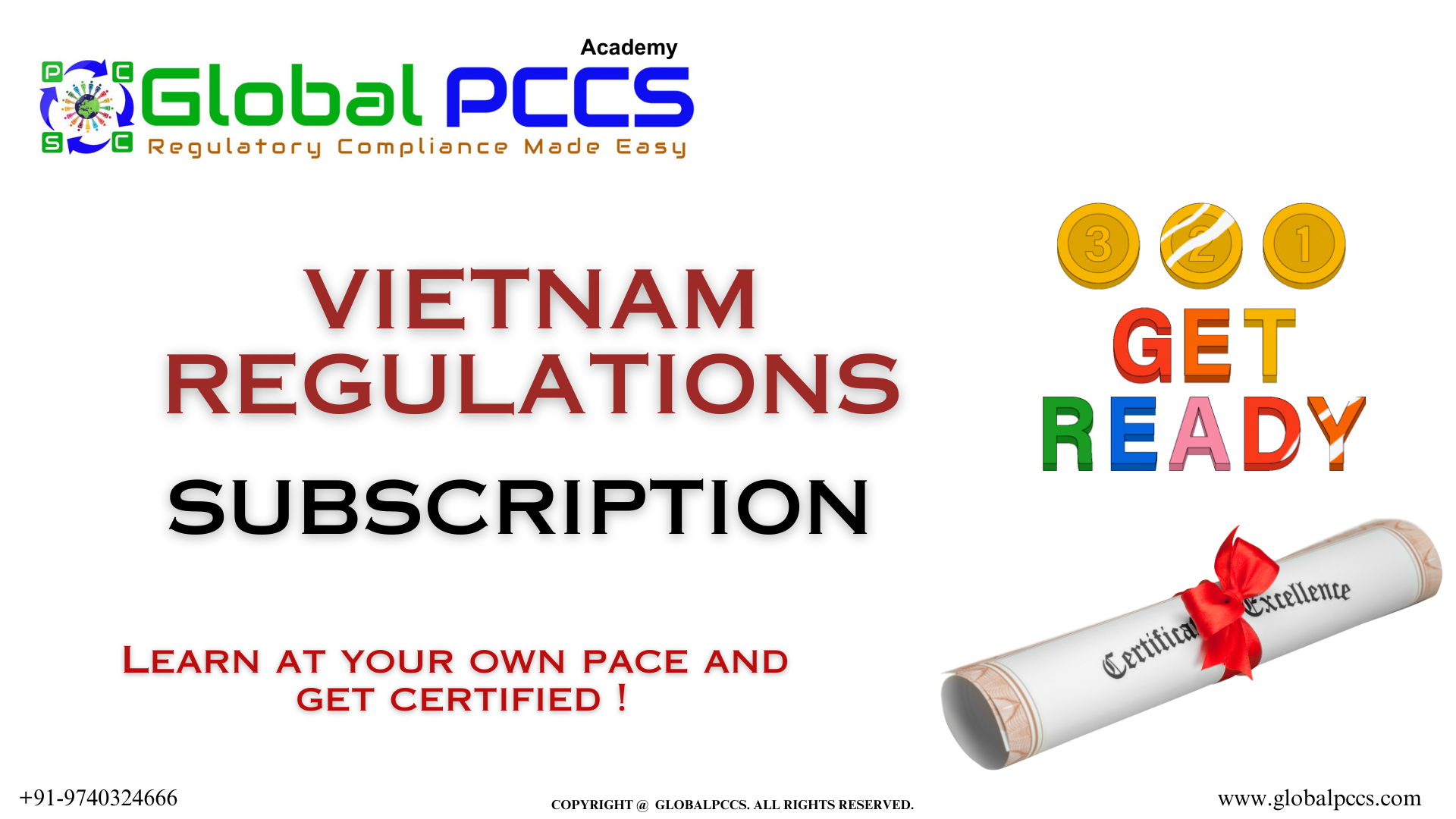Vietnam Regulations – Subscription
Categories: Compliance, Vietnam

About Course
Vietnam Regulations
Vietnam has implemented regulations to govern the management, use, and disposal of materials and chemicals. Key aspects of material and chemical regulations in Vietnam include:
- Law on Chemicals:
- The Law on Chemicals regulates the manufacture, trade, use, and import/export of chemicals. It includes provisions for chemical safety assessments, labeling, and the registration of chemicals.
- National Technical Regulation on Chemical Safety:
- This regulation provides technical guidelines on chemical safety, covering aspects such as classification, labeling, packaging, and safety data sheets.
- Vietnamese Standards on Chemicals:
- Vietnam has established standards for various chemicals to ensure quality and safety. Compliance with these standards is often mandatory for businesses dealing with chemicals.
- Environmental Protection Laws:
- Various laws and regulations address environmental protection, including the control of emissions and pollutants to safeguard air, water, and soil quality.
- Occupational Safety and Health Regulations:
- Regulations are in place to ensure the safety and health of workers handling chemicals in the workplace. These regulations often cover storage, handling, and protective measures.
- Hazardous Waste Management:
- Regulations govern the management and disposal of hazardous waste generated from the use of chemicals.
- Biological Safety Regulations:
- Regulations may be in place to address the safe use and handling of biological materials, including genetically modified organisms (GMOs).
- Customs Regulations:
- Customs regulations may include requirements for the import and export of chemicals, including documentation and permits.
- Consumer Product Safety Regulations:
- Regulations related to the safety of consumer products, including those containing chemicals, may be in place to protect consumers.
- Packaging and Labeling Regulations:
- Regulations may specify requirements for the packaging and labeling of chemicals to ensure clear communication of hazards and safe handling instructions.
Businesses operating in Vietnam need to be aware of and comply with these regulations to ensure the responsible use of materials and chemicals, protect the environment, and adhere to health and safety standards. Specific details and updates should be obtained from relevant Vietnamese government authorities and regulatory bodies.
What Will You Learn?
- Vietnam's material and chemical regulations provides insights into a structured framework governing chemical management. Key learnings include understanding the Law on Chemicals, which regulates the entire lifecycle of chemicals. Compliance with national technical regulations ensures safe handling, labeling, and documentation. Adherence to Vietnamese standards guarantees quality and safety in chemical products. Environmental protection laws address emissions and pollutant control, while occupational safety regulations prioritize the well-being of workers. Knowledge of hazardous waste management and biological safety regulations emphasizes responsible practices. Customs and consumer safety regulations further contribute to a comprehensive understanding, fostering compliance with Vietnam's evolving chemical regulatory landscape.
Course Content
Vietnam Regulation List
-
Vietnam Regulation List
Automotive Industry Regulation List
-
Automotive Industry Regulation List
Regulation on automobile manufacturing, assembly, and import in Vietnam
Regulations on automobile manufacturing, assembly, and import in Vietnam, issued on October 17, 2017, by the Vietnamese government, plays a pivotal role in shaping the country's automobile industry. It outlines a comprehensive set of requirements for any entity involved in:
Manufacturing: Establishing and operating automobile manufacturing facilities within Vietnam.
Assembly: Assembling automobile components into finished vehicles within Vietnam.
Import: Bringing automobiles into Vietnam for commercial or personal use.
-
Latest Updates on Decree No. 116/2017/ND-CP: Outlines requirements for automobile manufacturing, assembly, and import
00:47 -
Regulation Introduction
-
Penalties
-
How to comply Regulation ?
National Technical Regulation: Emission Limits and Methods for Measurement of Emissions from Automobiles and Motorcycles
this regulation came into effect on December 28, 2012, and sets stricter emission standards for various categories of vehicles, including:
Motorcycles: Euro 3 standards for most categories, Euro 4 for high-powered motorcycles.
Passenger cars: Euro 4 standards for most categories, Euro 5 for some categories.
Light trucks: Euro 4 standards for most categories.
Heavy trucks: Euro 4 standards for most categories, Euro 5 for some categories.
-
Latest Updates
-
Regulation Introduction
-
Restricted Substances
-
Penalties
-
How to comply Regulation ?
Law on Chemicals
The main legislation governing chemical management in Vietnam is the Law on Chemicals, officially known as Luật Hóa Chất, promulgated on November 21, 2007, and effective on July 1, 2008. This comprehensive law aims to ensure the safe and sustainable management of chemicals throughout their lifecycle, from production and import to use, storage, and disposal.
-
Latest Updates
-
Regulation Introduction
-
Restricted Substances
-
Industries affected from the Regulation
-
Penalties
-
How to comply Regulation ?
Law on Forestry (2004)
This law specifically addresses forest management, protection, and development.
It covers topics like:
Forest classification and ownership
Forest protection measures
Sustainable forest management practices
Forest product harvesting and trading
Rights and obligations of forest users
-
Latest Updates
-
Regulation Introduction
-
Industries affected from the Regulation
-
Penalties
-
How to comply Regulation ?
Law on Water Resources
Regulates water use, conservation, and protection against pollution.
-
Latest Updates
-
Regulation Introduction
-
Restricted Substances
-
Industries affected from the Regulation
-
Penalties
-
How to comply with the law on Water Resources?
Law on Land Use
Manages land use planning, allocation, and protection against degradation.
-
Latest Updates
-
Regulation Introduction
-
Industries affected from the Regulation
-
Penalties
-
How to comply Regulation ?
Law on Biodiversity
Protects endangered species and ecosystems.
-
Latest Updates
-
Regulation Introduction
-
Industries affected from the Regulation
-
Penalties
-
How to comply Regulation ?
National Technical Regulations (QCVNs)
Set specific technical standards for environmental protection in various sectors, such as emissions, wastewater discharge, and hazardous waste disposal.
-
Latest updates
-
Regulation Introduction
-
Restricted Substances
-
Industries affected by National Technical Regulations
-
Penalties
-
How to comply with National Technical Regulations
Law on Occupational Safety and Health (OSH Law) 2015
This comprehensive law serves as the backbone of OSH regulations in Vietnam. It covers:
Employer responsibilities for worker safety and health.
Employee rights and obligations regarding OSH practices.
Hazard identification, risk assessment, and control measures.
Workplace safety regulations for different sectors.
Accident reporting and investigation procedures.
OSH training and education requirements.
-
Latest updates
-
Regulation Introduction
-
Industries affected from the regulation
-
Penalties
-
How to comply the regulation?
Customs Regulations
Vietnam's customs regulations are comprehensive and aim to facilitate smooth trade while safeguarding the country's economic and social interests.
-
Latest updates
-
Regulation Introduction
-
Restricted Substances
-
Industries affected by regulation
-
Penalties
-
How to comply with the regulation?
Earn a Certificate & Up-skill yourslef
Add this certificate to your CV to demonstrate your skills & increase your chances of getting noticed & promoted.

Student Ratings & Reviews

No Review Yet